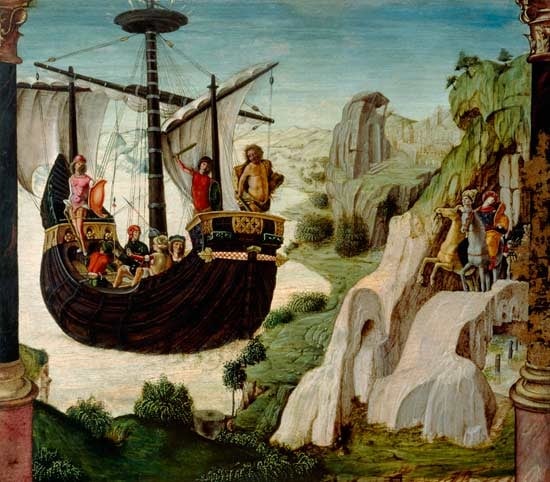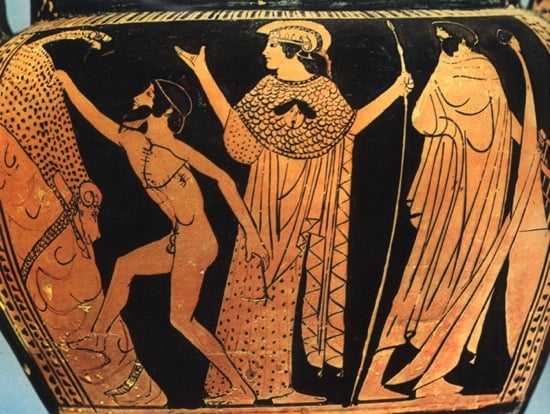EPIC WINS (3)
By:
June 8, 2011
Third in a series of translations/variations of epic poems.
BEASTLY NUISANCE
An episode from Book II (815-834) of The Argonautica (3rd century BCE), by Apollonius of Rhodes.
Translator’s note: The crew of the Argo are a violently quarrelsome lot. Even before the ship sails, the adventurers have divided into factions: one loyal to Jason, and the other spurred on by Idas, a mighty-thewed braggart more interested in treasure and conquest than in finding the Golden Fleece. As they travel from place to place, one by one the argonauts are killed under mysterious circumstances. Though Apollonius asks the reader to believe the accounts of those reporting back on these deaths, it’s deliciously tempting to read this episodic poem as a suspenseful slasher mystery sans detective, along the lines of Agatha Christie’s And Then There Were None.
Shortly before the following episode, which takes place in the land of the Mariandynians, Jason’s loyal supporter, Idmon the Knowing, had defended Jason against Idas’ scornful rage; Peleus, an exiled murderer every bit as wrathful as his son Achilles will be, isn’t (yet) a member of either faction.

The three young men clambered up to the summit of the island. Idas, climbing with the lethal grace of a panther, was the first to arrive. Turning, he summed up Peleus in a flash of his quick moving eyes.
A cool customer, he should imagine. And one who could hold his own — in love or war. I like the cut of his jib.
He frowned. No, cut out all that kind of stuff. This is business. He’d got to keep his mind on the job.
Idas offered Peleus a hand up. As Peleus took it, he recalled what the Assistant Oracle (three sheets to the wind) had confided to him: “Idas has been mixed up in some very curious shows abroad. He’s sailed very near the law once or twice. Got a reputation for daring and for not being over-scrupulous. Sort of fellow who might do several murders in some quiet out-of-the-way spot.”
Funny sort of cove altogether. He’s got a damned strong grip, anyway, Peleus thought.
Toiling uphill well behind the others, and sweating profusely, Idmon didn’t consider himself particularly knowing. What in the deuce was he doing in this isolated spot with a man who’d killed not only his own step-brother, but also his own father-in-law? True, the Sphinx had absolved Peleus of both charges — he’d hit Phocus with a discus, and he’d accidentally shot Eurytion while hunting the Caledonian boar. But it was deuced funny how people around Peleus tended to suffer tragic accidents.
At least, if things get sticky, I’ll have Idas on my side. Idmon prided himself on his ability to read men and their motives; though it must be pointed out that his colleagues at Oracle HQ hadn’t rated his skills as highly. That’s why he’d struck out on his own, as a private seer…
Peleus and Idas quietly discussed the augury which had foretold doom for Idmon before the Argo set sail. “Knowing that he, why did the son of a gun come along?” Peleus wondered. “Perhaps he was running from something.” Idas, aware that Peleus was probing for an answer, replied, “I wasn’t an oracle, you know — though I did a few tricky bits of work for their outfit. I always thought he was a bad hat, myself. But nothing was ever proven against Idmon, and he went freespear of his own volition.”
True, he’s a soldier of fortune who sees no problem with having self-preservation as his highest value, Idmon was telling himself at that moment. But Idas wouldn’t stab a fellow in the back.
As Idas helped him to the top of the cliff, Idmon noticed that he wore a sawed-off xyston strapped to his upper thigh, cunningly concealed beneath his chiton. He was “taken aback,” as he’d heard the sailors say when the wind blew on the wrong side of the sails. But only for a moment. I should be relieved, Idmon reassured himself. Idas likely shares my mistrust of Peleus.
The explorers stood together, peering into the entrance of the dark cavern before them.
Ἔνθα δ’ Ἀβαντιάδην πεπρωμένη ἤλασε μοῖρα Ἴδμονα, μαντοσύνῃσι κεκασμένον. [And here his destined fate smote Idmon, son of Abas, skilled in soothsaying; but not at all did his soothsaying save him, for necessity drew him on to death.]

Later, back at the Argo, Idas recounted to Jason and the others what had transpired: “In the cave there lay, unbeknownst to us, cooling his flanks and huge belly out of the sun’s glare, an enormous bear! As Idmon approached the cave, the bear leapt out of it and — charging — gashed his thigh, severing the sinews and snapping the bone.”
“Idmon fell with a sharp cry,” interjected Peleus. “I shouted and waved, and the savage monster retreated.”
Jason stretched himself, yawned, looked up at the blue sky. Several Argonauts looked at him admiringly — his six feet of well-proportioned body, his crisp hair, tanned face, and intensely blue eyes. Fizzing hot day! he thought. This island place was supposed to be rather good fun.
“We rushed to Idmon’s side,” continued Idas. “But he was beyond help.”
“Are you injured?” demanded Atalanta gruffly. She pointed a callused finger at Idas’ thigh. The assembled sailors muttered with surprise, for indeed there was a spreading bloody stain upon Idas’ chiton. Stepping forward, Atalanta tweaked aside the linen cloth and revealed — not a wound, but instead Idas’ sinister xyston, caked with gore. Angry murmuring began among Idmon’s comrades.
Idas and Peleus, suddenly, looked less like human beings. They were reverting to more bestial types. Peleus looked coarser and clumsier in build. His eyes were bloodshot. There was a look of mingled ferocity and stupidity about him. He was like a beast at bay ready to charge its pursuers. Idas’ senses seemed heightened, rather than diminished. His ears reacted to the slightest sound. His body was lithe and graceful — and he smiled, his lips curling back from his long, white teeth.
“The bear jibed, trimmed his sails, and sailed at us again,” Idas said. “We were at close quarters in a moment. I drew my xyston, and — with a roar — the savage beast impaled itself upon it.”
A fraught silence descended upon the scene, disturbed only by the sound of Atalanta loosening her xiphos in its oiled sheath.
“I don’t know,” said Jason, eventually. “It all sounds very…”
“Remember Idmon’s augury, my lord!” Idas was at his most convincing, now. “‘Three little sailor boys walking in the zoo;/A big bear hugged one and then there were two.'”
Peleus said nothing; he glowered.
“Yes, well,” said Jason, after a moment. “You may be onto something, there, old man. Beastly nuisance.”
EPIC WINS: SERIES INTRO by Matthew Battles | THE ILIAD (1.408-415) by Flourish Klink | THE KALEVALA (3.1-278) by James Parker | THE ARGONAUTICA (2.815-834) by Joshua Glenn | THE ILIAD by Stephen Burt | THE MYTH OF THE ELK by Matthew Battles | GOTHAMIAD by Chad Parmenter
MORE original fiction at HILOBROW; and stories by HILOBROW’s Matthew Battles
SIMILAR HILOBROW SERIES: DIPLOMACY — a world-conquest boardgame musical | FITTING SHOES — famous literary footwear | KIRB YOUR ENTHUSIASM — 25 Jack Kirby panels | SECRET PANEL —Silver Age comics’ double entendres | SKRULLICISM
